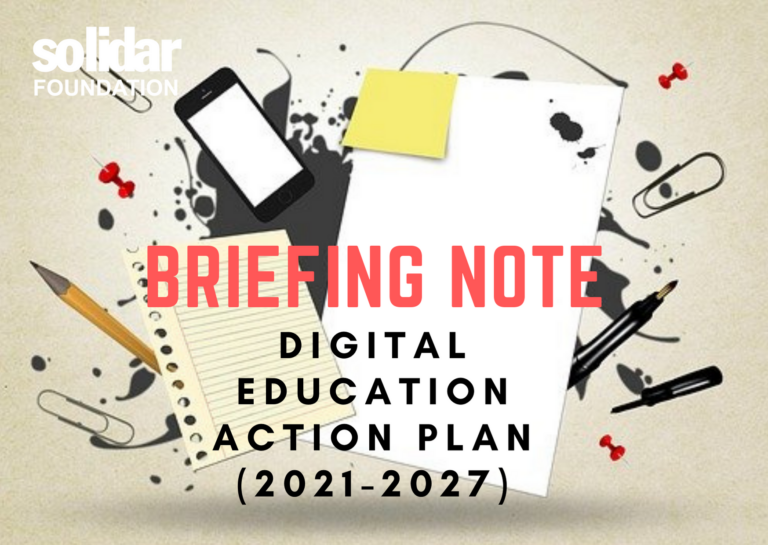European Education Area and the Digital Education Action Plan – First hesitant steps towards inclusive education
On 30 September 2020, the European Commission updated its vision of the European Education Area (EEA) setting out the roadmap on achieving this by 2025 and presented the Updated Digital Education Action Plan (DEAP).
The Digital Education Action Plan update
The DEAP acknowledges the comments of SOLIDAR Foundation in the public consultation related to the long-term vision of the plan, as it clearly understands the need for all stakeholders to be involved equally in the process of digitalization, ensuring that everyone obtains the basic digital skills. The Action Plan also acknowledges the digital infrastructure gaps, providing a comprehensive approach which SOLIDAR Foundation revealed as necessary in its Monitor even before the start of the pandemic. However, SOLIDAR Foundation deplores the overtly optimistic approach to AI and the concerning business and labour market orientation to upskilling and reskilling efforts that misses the point for citizens’ needs in the digital age. We must ensure that the digital transition is grounded in a rights-based approach and that digital education is approached as a question of education and participation before competitiveness says Mikael Leyi, Secretary General of SOLIDAR Foundation.
Read the full analysis of the Digital Education Action Plan by SOLIDAR Foundation.
The European Education Area
In relation to the EEA, SOLIDAR Foundation welcomes the coherent and comprehensive vision put forward by the European Commission with this Communication and its consistent building upon the European Pillar of Social Rights, but it expresses its worry at the unclear means through which the goals would be met. The vision for the European Education Area is constructed on six dimensions: quality, inclusion and gender equality, green and digital transitions, teachers and trainers, higher education and the geopolitical dimension. For each, the Communication acknowledges the current issues and sets forward the goals for the coming years, while presenting the means and milestones for achieving them. The Communication ends with a vague presentation of the enabling framework, which shall be used to coordinate the efforts of the Commission and Member States in achieving the EEA.
It is a relevant step towards fairer societies for the Commission to acknowledge the inequalities that still persist across the EU in relation to access to quality education, through an accurate identification of the issues to be tackled to achieve an inclusive European Education Area. Addressing equal access to quality education means to tackle one dimension of social injustice, which is a precondition for sustainable societies. The updated EEA also starts to recognise the role of non-formal education and lifelong learning for the provision of transversal skills, including critical thinking and civic engagement, through transdisciplinary, learner-centred and challenge-based approaches. This is a positive step towards the recognition of non-formal education as the pivot for access to education for all. Building on its previous initiatives, the Commission promotes the fostering of transversal skills through the Erasmus+ programme, while committing to scale up the implementation of the Council Recommendation of 22 May 2018 on promoting common values, inclusive education, and the European dimension of teaching.
However, in describing the identified challenges – such as inclusiveness, quality and the green and digital transitions – and given the vast undertaking of creating the EEA and reforming education for all, it is surprising that the Commission did not insist on including all stakeholders, especially CSOs and non-formal education providers, in the efforts to achieve the EEA. SOLIDAR Foundation advocates for the Commission to use the expertise on the ground in all member states – the work of CSOs will be of significant aid for targeted policy-making that can make education serve as an effective driver for achieving sustainable societies. As a result of this shortcoming, it has also missed the opportunity to consider the role of Global Citizenship Education, on which CSOs and non-formal education providers are working intensely, to achieve the goals that it sets out. In this sense, SOLIDAR Foundation is looking forward to joining education stakeholders in the process leading to the 2021 Council Recommendation on education for environmental sustainability and to the European Competence Framework to help develop and assess knowledge, skills and attitudes on climate change and sustainable development. Nonetheless, we call for CSOs to be included in the Education for Climate Coalition, to be launched by the Commission by the end of 2020.
SOLIDAR Foundation acknowledges the value of the proposals put forward in this Communication but it also stresses problematic aspects in relation to the resources indicated for the implementation. The Commission proposes indeed new ways in which Member States can access European Structural and Investment Funds, the Recovery and Resilience Facility, European Social Funds and the Erasmus+ funding to pursue the goals set out in the European Education Area. But it does so with limited guidance on how this can be done and in a context of uncertainty over the long-term budget that the Member States can access given the current negotiations for the upcoming Multiannual Financial Framework (MFF).
SOLIDAR Foundation welcomes the European Commission’s recognition of the current issues in education, as well as its EEA goals, but calls on more clarifications on how this will be funded and on the enabling framework. There is a need for the Commission to take greater initiative in guiding Member States as the reliance on them given the current health crisis, given the increased pressures that teachers and trainers are experiencing across Europe and given the current MFF negotiations that run the risk of securing insufficient funding for education, is misplaced. It is in these moments that all education stakeholders should contribute to the policy making and implementation. The on-the-ground experience of non-formal education actors proves to be invaluable, says Mikael Leyi, and from SOLIDAR Foundation we call on the Commission to ensure more involvement on their side in achieving the EEA.
Read the full analysis of the European Education Area by SOLIDAR Foundation.



